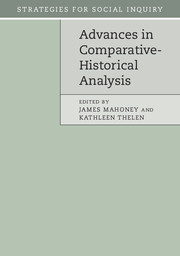Book contents
- Frontmatter
- Contents
- List of figures
- List of tables
- List of contributors
- Preface
- Part I Introduction
- Part II Agenda-setting work
- Part III Tools for temporal analysis
- 5 Power and path dependence
- 6 Critical junctures and institutional change
- 7 Drift and conversion: hidden faces of institutional change
- Part IV Issues of method
- Epilogue: comparative-historical analysis: past, present, future
- Index
- References
6 - Critical junctures and institutional change
from Part III - Tools for temporal analysis
Published online by Cambridge University Press: 05 July 2015
- Frontmatter
- Contents
- List of figures
- List of tables
- List of contributors
- Preface
- Part I Introduction
- Part II Agenda-setting work
- Part III Tools for temporal analysis
- 5 Power and path dependence
- 6 Critical junctures and institutional change
- 7 Drift and conversion: hidden faces of institutional change
- Part IV Issues of method
- Epilogue: comparative-historical analysis: past, present, future
- Index
- References
Summary
Critical juncture analysis is popular in comparative-historical analysis (CHA) since it provides tools for studying the political origins and reform of important institutional arrangements that exert a long-lasting influence on their social and political environment. This chapter clarifies a number of theoretical and conceptual issues, explores the strengths and weaknesses of the critical juncture approach, and proposes a methodological strategy for studying critical junctures in comparative perspective.
It is necessary to define the scope of the discussion by making two preliminary observations. First, the “dual” model of historical development intrinsic to critical juncture analysis – shorter phases of fluidity and change alternating with longer periods of stability and adaptation – has been applied to a wide range of outcomes and entities, from individual life histories to the development of groups and organizations and the evolution of entire societies (e.g., Swidler 1986, 280). In this chapter, I focus on the use of the concept of critical junctures in the context of the development of institutions, broadly defined as organizations, formal rules, public policies, political regimes, and political economies. These have generally been the object of critical juncture analysis in CHA in both political science and sociology.
Second, within CHA, the concept of critical juncture applies only to the analysis of path-dependent institutions and not to all forms of institutional development. The analysis of critical junctures is a part of path dependence arguments, according to which institutional arrangements put in place at a certain point in time become entrenched because of their ability to shape the incentives, worldviews, and resources of the actors and groups affected by the institution. In this analytical context, critical junctures are cast as moments in which uncertainty as to the future of an institutional arrangement allows for political agency and choice to play a decisive causal role in setting an institution on a certain path of development, a path that then persists over a long period of time.
- Type
- Chapter
- Information
- Advances in Comparative-Historical Analysis , pp. 147 - 179Publisher: Cambridge University PressPrint publication year: 2015
References
- 173
- Cited by

